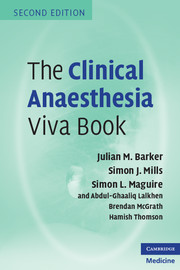Book contents
- Frontmatter
- Contents
- List of contributors
- Foreword by Pete Nightingale
- Preface
- Acknowledgements
- 1 Preparation for the Clinical Viva
- 2 The Short Cases
- 3 The Long Cases: ‘The one about…’
- Appendix 1 A system for interpreting and presenting chest X-rays
- Appendix 2 Interpretation of commonly occurring PFTs
- Index
Foreword by Pete Nightingale
Published online by Cambridge University Press: 12 January 2010
- Frontmatter
- Contents
- List of contributors
- Foreword by Pete Nightingale
- Preface
- Acknowledgements
- 1 Preparation for the Clinical Viva
- 2 The Short Cases
- 3 The Long Cases: ‘The one about…’
- Appendix 1 A system for interpreting and presenting chest X-rays
- Appendix 2 Interpretation of commonly occurring PFTs
- Index
Summary
In the 7 years since this popular book was first published, there have been a number of changes in the Final FRCA Examination. In accordance with the standards laid down by the Regulator, the Postgraduate Medical Education and Training Board (PMETB), these changes have been intended to increase the reliability of the examination, particularly the vivas, which are now known as ‘structured oral examinations’ reflecting the changes introduced.
However, to the aspiring candidate entering the examination hall, these changes are of little concern; the knowledge and presentation skills needed when answering a question are the same as they have always been. And, that is where this book will be of immense assistance.
There are excellent tips on revising for the examination, how to present a case or answer a direct question, and useful hints on interpreting the chest X-ray and other data. With an excellent index to help, there is a huge amount of clinical material to work through for the Long Cases and Short Cases. Because no two vivas are ever the same, even with identical opening questions, the authors have provided much more information than would be expected during the actual vivas. This allows for revision in areas where the Examiners may, or may not, lead you depending on how well you are doing.
The authors rightly stress the need to structure your answers and that there may be no right or wrong answer to some of the clinical questions.
- Type
- Chapter
- Information
- The Clinical Anaesthesia Viva Book , pp. xi - xiiPublisher: Cambridge University PressPrint publication year: 2009



